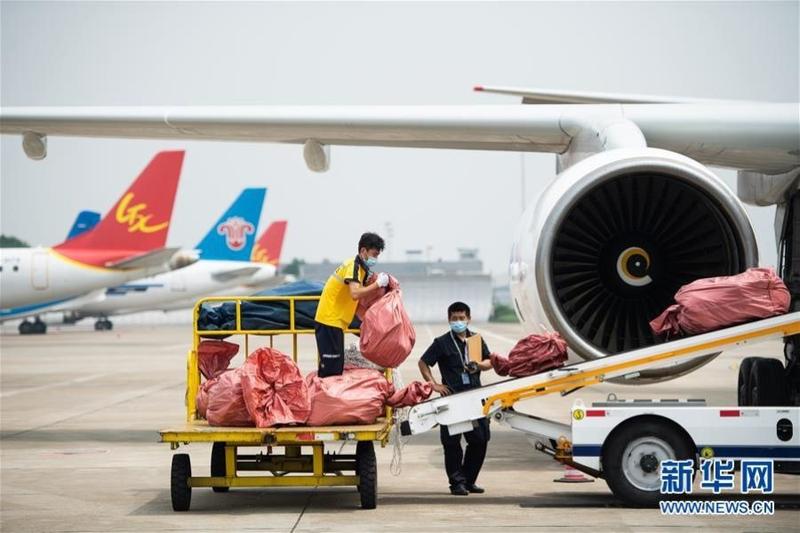 Workers load the cross-border e-commerce packages, at Huanghua International Airport in Changsha, Hunan province, on May 28, 2020. (PHOTO / XINHUA)
Workers load the cross-border e-commerce packages, at Huanghua International Airport in Changsha, Hunan province, on May 28, 2020. (PHOTO / XINHUA)
The central government's recent decision to construct a modern logistics system to support the dual circulation development pattern would guide infrastructure investment into high-efficiency transportation including airports and high-speed railway development, experts said.
They said a modern and efficient logistics system will help provide strong market dynamism for balancing supply and demand, industrial upgrading, improving economic efficiency and fostering high-quality development in the country.
Experts said a modern and efficient logistics system will help provide strong market dynamism for balancing supply and demand, industrial upgrading, improving economic efficiency and fostering high-quality development in China
Feng Tianjun, a professor at Fudan University's School of Management in Shanghai, said it was of great significance for the meeting of the Central Committee for Financial and Economic Affairs to make the decision on developing the modern logistics system on Wednesday.
"Building a modern logistics system with enhanced cargo capacity on high-speed railways and international flights will drive infrastructure investment in airports and high-speed railways, as well as other transportation solutions."
The decision came as the country faces a grim and complicated economic situation both at home and abroad and is transitioning from a phase of rapid development to a new stage of high-quality development.
ALSO READ: Modern logistics development given emphasis
"Logistics is a basic, strategic and guiding industry that supports the development of the national economy," the National Development and Reform Commission, China's top economic planner, said in a statement last week. "We are in need of a well-developed logistics system to help create a strong domestic market and build a modern economic system."
Wang Yong, a visiting professor at the KTH Royal Institute of Technology in Stockholm, Sweden, said China has entered a crucial phase in which the country needs to upgrade its logistics system.
"The modern logistics system is an important carrier connecting consumers and producers, as well as a key part of China's domestic market. And it also provides strong support to build a new model of development in which the domestic economic network takes the primary role, with the domestic and international economic networks complementing each other.
"In the battle against the COVID-19 outbreak, China's logistics system has withstood the test of pressure and time. However, problems remain such as insufficient supply and the relatively low level of development," he added.
Wang said more efforts are needed to expand the effective supply in the logistics market, boost infrastructure development, promote information application and big data development in the logistics field, develop smart logistics and distribution, drive innovation in the supply chain and improve standards and the regulatory system.
"Logistics is the precondition for distribution, and modern logistics cannot make efficient deliveries without infrastructure such as airports," said Feng at Fudan University.
According to Feng, airports are the fundamentals for high-efficiency logistics, as "it is the sufficient number of airports and the strong aviation network that have enabled FedEx to reach its scale to date".
READ MORE: Logistics firms to gain from new policy moves
China's leading logistics firms SF Express and YTO Express have already recognized the significance of infrastructure, and made great investment in air cargo distribution centers to gain a bigger share of domestic and overseas markets.
The nation's first freight airport is being built by SF Express in Ezhou, Hubei province. The logistics hub is expected to come into operation by the end of 2021, according to Ren Hong, an official at the National Development and Reform Commission.
Shanghai YTO Dragon Investment Development (Group) Co Ltd, the parent company of YTO Express, is also planning to build an international aviation logistics hub in Jiaxing, Zhejiang province. The hub, which will involve a total investment of 6.61 billion yuan ($970 million), is expected to have an annual freight handling capacity of 2.4 million tons by 2050.
Eastern Air Logistics Co, the freight unit of China Eastern Airlines, is developing in line with the Chinese people's upgraded consumption requirements, which sees a greater role for high-quality products, fresh goods, cross-border e-commerce and high-end manufacturing.
With state-of-the-art technology, the company aims to become a key player in the logistics sector and the supply chain.
Yu Zhanfu, partner and vice-president for China at consultancy Roland Berger, sees broad opportunities for innovating and upgrading the Chinese logistics network safely and efficiently and connecting both the internal and external markets.
READ MORE: Cargo carriers urged to spearhead mega multimodal logistics grid
One of the investment opportunities comes from increased digitalization. The participation of technology companies in the logistics industry could reform, affect or even replace the conventional logistics system, said Yu.
Likewise, high-speed railways are an irreplaceable part of multimodal transport, together with sea, road and air transport, and the preferable choice for quality express delivery, said Feng.
Qi Qi, an associate professor at Guangzhou Civil Aviation College, said the COVID-19 outbreak highlighted the importance of logistics during a public health emergency.
"During this critical time, we found there is an urgent need for improvements to the transportation infrastructure, namely insufficient air cargo capacity, a shortage of specialized freight airports, the lack of international standard large logistics companies, less efficient multimodal transport, and a deficiency in emergency logistics," Qi said.
Qi looked forward to concrete plans being worked out in accordance with the nation's overall development of a modern distribution system, with specific projects designed to strengthen China's overall logistics sector and the supply chain.
Contact the writers at wang_ying@chinadaily.com.cn


